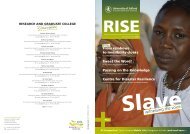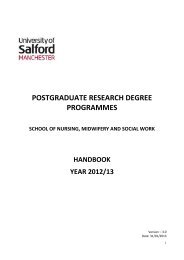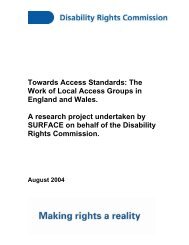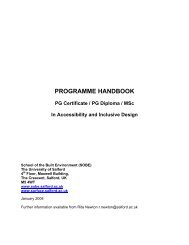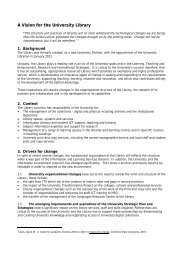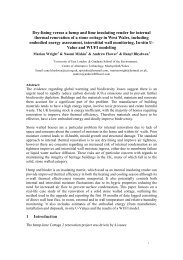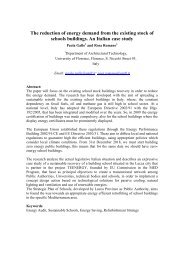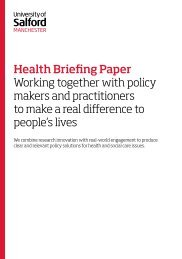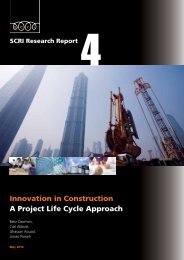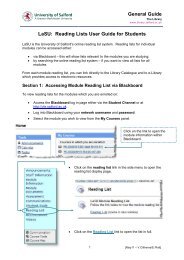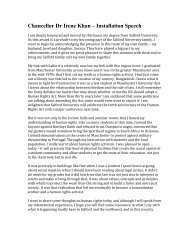RISE May-June 2009 - University of Salford
RISE May-June 2009 - University of Salford
RISE May-June 2009 - University of Salford
Create successful ePaper yourself
Turn your PDF publications into a flip-book with our unique Google optimized e-Paper software.
<strong>RISE</strong>! Research Innovation and Internationalisation News<br />
SUPPORT FOR RESEARCH<br />
BIDDING<br />
The latest round <strong>of</strong> the Research Bidding Support Fund has<br />
provided awards to support the preparation <strong>of</strong> a wide range<br />
<strong>of</strong> bids in areas as diverse as X-ray optics, Holocaust<br />
museums, parasites and jazz cultures. This scheme has been<br />
developed to support the <strong>University</strong>’s strategic objective <strong>of</strong><br />
achieving an annual research grants and contracts income <strong>of</strong><br />
£30 million by 2015.<br />
The fund is run twice per year and is designed to help <strong>of</strong>fset the costs<br />
<strong>of</strong> preliminary activities associated with putting together large-scale<br />
research bids, especially collaborative proposals involving industrial or<br />
academic partners. The fund provides awards up to a maximum <strong>of</strong><br />
£3,000 and can be used to support a range <strong>of</strong> activities, including<br />
travel, teaching time buy-out and preliminary research studies.<br />
For further information see www.rgc.salford.ac.uk/page/<br />
internal_funding or contact Matt Boswell in the Research &<br />
Graduate College on 0161 295 4301 or at:<br />
m.j.boswell@salford.ac.uk<br />
WOMEN IN CONSTRUCTION<br />
The Research Centre for Construction Innovation (CCI) as part<br />
<strong>of</strong> the School <strong>of</strong> the Built Environment (SOBE) will be<br />
successfully entering their third year <strong>of</strong> supporting and<br />
training women to enter, stay and progress in the<br />
construction industry.<br />
Dr Lisa Worrall and Katy<br />
Harris have further acquired<br />
the additional responsibility<br />
<strong>of</strong> broadening this activity<br />
base from the North to<br />
include the Midlands. This<br />
expanded third phase will be<br />
launched from April. During<br />
Phases I and II, Katy and Lisa received media attention and coverage in<br />
both North West and North East regional newspapers and were interviewed<br />
by Heather Stott <strong>of</strong> BBC Radio Manchester.<br />
Due to the hundreds <strong>of</strong> women in construction benefiting from the<br />
training, support and workshops on <strong>of</strong>fer and complimenting on the<br />
passion, vision and support <strong>of</strong>fered by its project managers, both Lisa<br />
and Katy have received invites to talk about their activities and services<br />
on both BBC radio and Channel M TV. Word <strong>of</strong> this project is spreading<br />
further afield, with recent queries for information and interviews about<br />
the Women in Construction project that is funded by Construction Skills<br />
coming from BBC Radio in London.<br />
If you would like to know more about this project contact either Lisa<br />
or Katy at: L.J.Worrall@salford.ac.uk or Katy.Harris@ccinw.com or<br />
visit the website at: www.wicnet.org.uk<br />
SHAKESPEARE INTERPRETED<br />
<strong>Salford</strong> <strong>University</strong> academic Sameh Hanna’s article ‘Othello in<br />
the Egyptian vernacular: negotiating the ‘doxic’ in drama<br />
translation and identity formation’ was published in the<br />
special issue <strong>of</strong> The Translator in April <strong>2009</strong> on Translation and<br />
Nation in the Middle East.<br />
The article, which is part <strong>of</strong> Sameh’s current interest in elaborating<br />
sociology <strong>of</strong> drama translation inspired by Pierre Bourdieu’s sociology <strong>of</strong><br />
cultural production, investigates the workings <strong>of</strong> identity politics in<br />
twentieth century Egypt and how drama translators can play a<br />
significant role in promoting/silencing different versions <strong>of</strong> national<br />
identity. This is the latest in a series <strong>of</strong> articles in which Sameh is<br />
attempting to map out the ‘field’ <strong>of</strong> drama<br />
translation in Egypt, its genesis,<br />
development, the agents with stakes<br />
in drama translation and the<br />
different forms <strong>of</strong> capital they<br />
struggle over. The fact that<br />
Shakespeare has been widely<br />
politicised in Arabic to enact different<br />
political and socio-cultural goals has<br />
motivated Sameh’s sociological<br />
approach to the Arabic translations<br />
<strong>of</strong> Shakespeare in Arabic.<br />
If you would like to know more about<br />
Sameh’s work please contact him at:<br />
s.hanna@salford.ac.uk<br />
13




